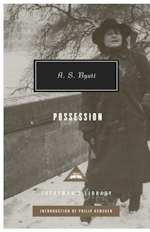

He first has to let the machine warm up, and then: "in the dim and hum of the extractor fan he took out the two letters and read them again. This is a book where it's impossible for a character to simply photocopy something. Byatt luxuriates in long digressions and ornate descriptions. These wordy Victorian outpourings are (of course) reflected back, in a modern narrative that is every bit as baggy and rich as those that the best Victorians used to trot out.

Yet more impressive are in excess of 1,700 lines of original poetry, generally set at a pitch of intensity worthy of the pre-Raphaelites and dripping in allusion and metaphor. There are more than 100 pages of invented – and generally convincing – journal extracts. To bring her Victorians to life, for instance, Byatt doesn't simply tell their stories, she sets down their own words. The effect is dazzling – and similarly ludic erudition is on display throughout. The two academics fall for each other as did the two Victorian poets in the central story, while hundreds of other points of light spread from them, like crystals on a chandelier, showing various reflections on ideas about ownership and loss, attitudes to sexuality and celibacy, reactions to the compromises of cohabitation and living alone, notions of privacy, personal autonomy and public good, mythologies and counter-mythologies … So it reads like the Da Vinci Code – only with brains and a sense of the absurd.Īnother amusement layered within this gentle pastiche is – to borrow a phrase from one of the novel's characters – a sophisticated "mirror game".

It swaps the private dicks for two literary academics – Maud Bailey and Roland Mitchell – who use their skills in textual analysis to follow a series of arcane clues in order to unravel a mystery surrounding two Victorian poets (Randolph Ash and Christabel LaMotte). Indeed, the entire book is a clever joke a sophisticated riff on the manners and tropes of detective novels. Anyone and everything that falls under Byatt's gaze is a source of fun. It lampoons a certain type of overwhelming, over-articulate American. It laughs at English eccentricities, foibles and inability to talk about emotion. It sends up academics of all stamps (dusty, thrusting, shy, ambitious, greedy, gender-obsessed, sex-obsessed, celibate). Among (many) other things, Possession is a wonderful comedy of manners. The first thing that surprised me about an author I had previously pigeon-holed a dry old stick was how witty she is – and how playful. I part company with Evers, however, from that point on – perhaps because we chose different books with which to reacquaint ourselves with the writer.


 0 kommentar(er)
0 kommentar(er)
